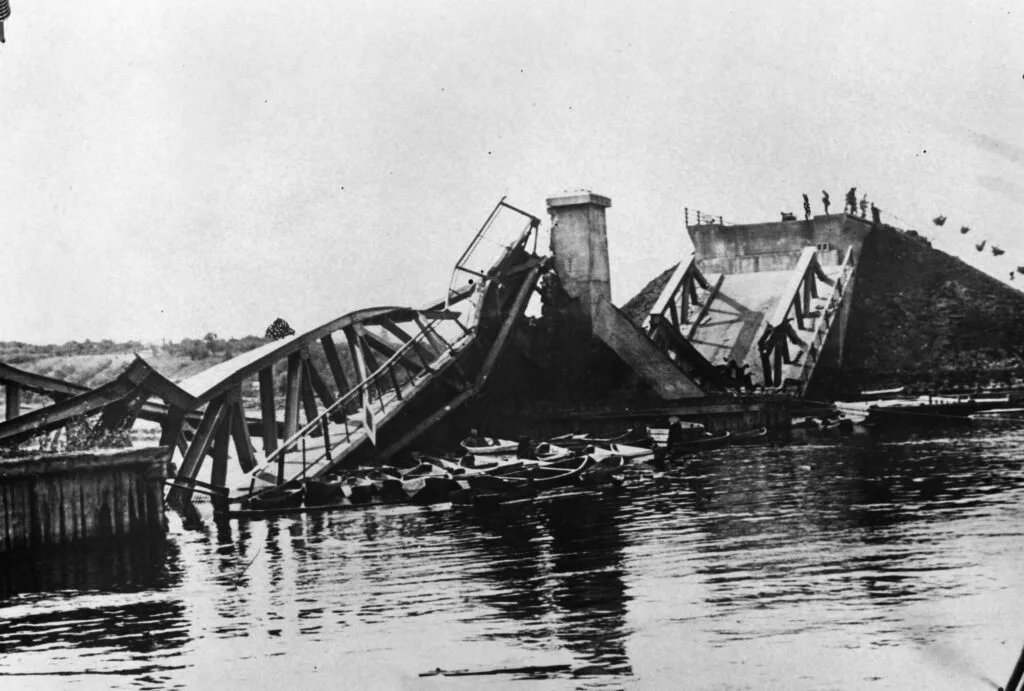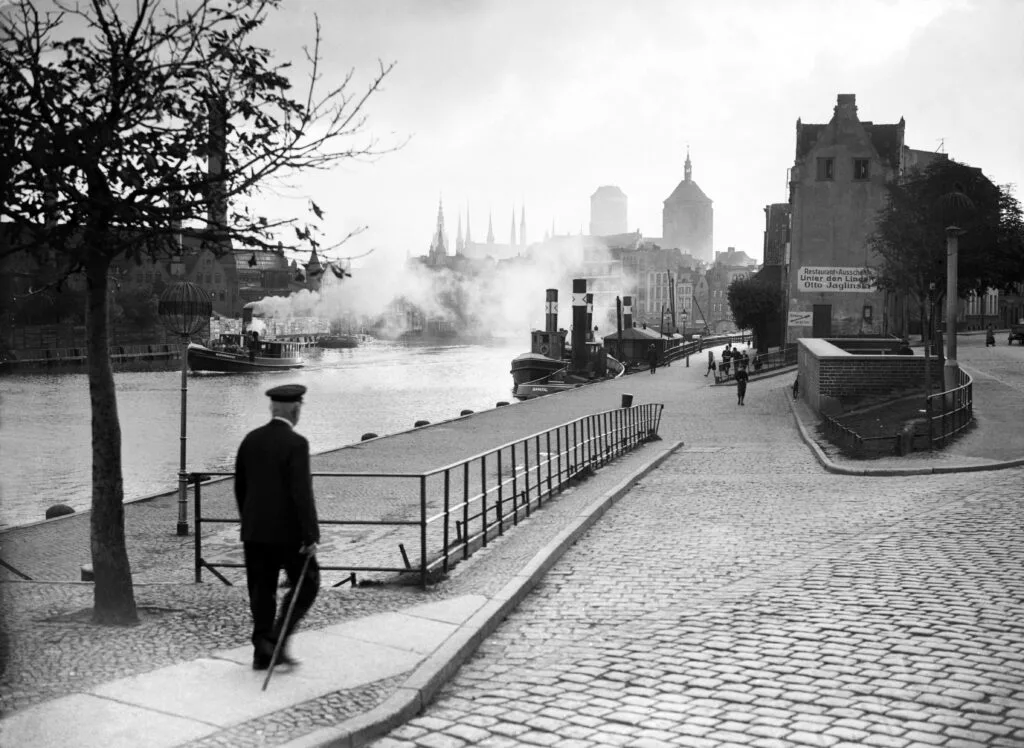CZĘSTOCHOWA, Poland — Agnieszka Majewska, a grandmother and retired shop worker from a village near Lublin in eastern Poland, has no doubt it is high time for Germany to compensate Poles for the murderous devastation it wrought during World War II.
We are standing outside the Chapel of Our Lady at the Jasna Góra Monastery in Częstochowa. It is packed with worshippers, as every day of the year. They kneel and pray where the young seminarian Karol Wojtyła — later Pope John Paul II — made a secret visit during World War II, when the occupying Germans banned pilgrimages to Poland’s most important shrine.
There was good reason for the Nazis to fear such pilgrimages: The chapel houses the revered Black Madonna of Częstochowa, a four-foot-high icon credited by the Polish faithful with inspiring monks to defy a siege by a previous horde of invaders — the Swedes — in a near-miraculous victory in 1655.
No intervention spared Poland from the carnage of the 1939-1945 war. Nearly 6 million Poles were killed — almost 22 percent of the population. More than 90 percent of the dead were non-combatants; half were Jewish.
“Germany should pay up,” said the 64-year-old Majewska, on her third pilgrimage to Jasna Góra. “It is one of the reasons I’ll vote again for PiS,” she adds, referring to the Law and Justice Party which has been calling for reparations since first taking power in 2015 and has been doing so with mounting fervor over the past year, as the October 15 parliamentary election looms.
You may like
To put the topic right back at the top of the agenda, Poland’s Deputy Foreign Minister Arkadiusz Mularczyk, a member of PiS, has written to 3,000 town councils and local authorities urging them to pass symbolic resolutions backing the call for German reparations. All very useful when you are seeking to portray opposition leader Donald Tusk as a stooge of the EU, and particularly Germany.
While occupying German forces didn’t bomb the monastery, Częstochowa was earmarked for early harsh treatment and witnessed one of the very first Nazi massacres of the war when, on the fourth day of the invasion, the Wehrmacht began a three-day rampage of shootings and beatings that killed an estimated 1,140 Poles, 150 of them Jewish.
Distracting maneuver
PiS officials hope there are many more voters like Majewska.
POLITICO’s poll of polls suggests PiS will emerge from the election in four weeks as the largest party but will fail to secure a majority in the Sejm, the lower house of Poland’s bicameral parliament, meaning it will likely need the help of the extreme-right Confederation party to form a government. PiS leaders are desperate to ensure that doesn’t happen — and to prevent any upset by the centrist Civic Coalition led by Tusk.
Last year, the PiS government formalized a demand for reparations in a diplomatic note to Berlin for up to $1.3 trillion in compensation for the destruction caused by the Nazi occupation.
Berlin has repeatedly said all financial claims related to the war have been settled and German officials point to Poland’s then communist rulers in 1953 relinquishing all reparation claims. Last year, German Foreign Minister Annalena Baerbock said that while it is post-war Germany’s “eternal duty to remember the suffering Germany brutally inflicted upon millions of Polish people … the issue of reparations is, as you know, closed.”
In January, Germany formally rebuffed the reparations demand. PiS officials say the 1953 agreement cited by Berlin isn’t valid as it came about because of Soviet pressure on Warsaw — Moscow wanted to ensure its satellite of East Germany was free of any liabilities.

For the ruling party’s opponents, the demand for war reparations demand is a cynical electoral ploy. But they have been unsure how to handle it. When PiS announced plans last year to demand German reparations, Tusk, the former prime minister and leader of the main Civic Platform opposition party within the Civic Coalition, warned it was a “distracting maneuver” by PiS designed for “rebuilding support for the ruling party.”
But the Civic Coalition abruptly shifted position in September 2022, arguing that both Germany and Russia should be pursued for reparations. Nonetheless Tusk has been lukewarm, arguing the demand is unrealistic and saying, “everyone would like Poland to get more money for various reasons.” He has said he fears re-opening historical wounds.
There is also a thorny technical objection that few people in PiS want to discuss. Germany lost about a fifth of its prewar territory to Poland. An active debate about reparations reawakens the danger that Berlin could predicate discussions on paying reparations on getting its land back.
Town by town
PiS is now generating as much heat as it can on the issue, and Mularczyk has been spearheading the reparations campaign.
Still, Marta Prochwicz–Jazowska of the German Marshal Fund, argues that stoking up the issue might not have quite the impact PiS expects. Despite the fact that “a major part of the Polish population believes Germany owes Poland,” and polling last year showing 52 percent of Poles support reparations, she isn’t so sure it will have significant impact on the election.
The topic “will not determine voter preferences in the same way as security and defense, the war in Ukraine, the economy and social policies,” she said.
Reparations stir deep passions and not just among PiS-leaning voters, says Marcin Zaborowski, a director at Globsec, a think tank.
“The sense of injustice concerning Germany is skilfully used by Law and Justice,” he says. “In fact a similar method was used in the past by the communists who exploited anti-German sentiments to legitimize their hold on power. The only way to address these sentiments is for the German government to engage in a genuine dialogue with all major Polish political parties on the ways to address the legitimate grievances that are shared by the Polish population at large.”
Mularczyk is dong his best to try to turn the sense of grievance into an electoral factor.
“I am convinced that if we govern for another term, Germany will pay reparations to Poland, and the narrative about history will be closer to the narrative presented by Poland, not Germany,” he told the Polish Press Agency in June. Last month, Wieluń — a town in south-central Poland with a population of 22,000 — become the first council to respond positively to his request to pass a resolution on reparations.
Wieluń was the target of the first major attack of World War II, when on the morning of September 1, 1939, the Luftwaffe began bombing the town, turning about three-quarters of it into ruins, and killing hundreds.
The councils of Prudnik and Trzciana, in the south of the country, followed suit last month. And earlier this month, the city council of Lublin, 170 kilometers to the southeast of Warsaw, became the latest municipal authority to pass a motion calling for German compensation. Of the city’s 45,000 Jewish population at the start of the war, only 230 survived the occupation with the bulk murdered in the Bełżec extermination camp.
Mularczyk has also been highlighting the issue overseas and has the backing of U.S. Republican Congressman Chris Smith, who chairs the congressional Global Human Rights subcommittee. Smith has urged the U.S. government to encourage Berlin to negotiate with Warsaw on the grounds that Poland “suffered the most under Nazi Germany” but has been “one of the least compensated.”

While it remains to be seen whether the reparations campaign can help PiS eke out an election win next month, it is roiling already strained Polish-German relations with some pondering whether a re-elected PiS might try later to link German reparations with European efforts to secure Russian compensation for Moscow’s war on Ukraine.
Mularczyk appeared to hint at a link in a recent article for Britain’s Daily Mail.
“It is important that, to ensure European solidarity, and send the message to Russia that illegal wars cannot go unaddressed, Germany takes the necessary steps to discuss this issue openly and honestly with us,” he wrote.


